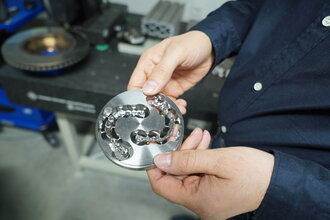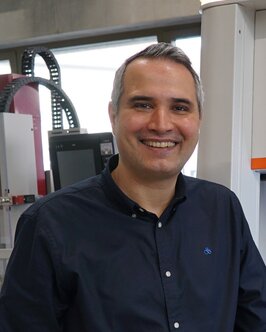
A model of a dental prosthesis milled “under snow”
HFU Institute for Advanced Manufacturing tests new process with CO2 “snow”
Joint and bone implants are an important part of modern medicine and their quality is crucial for the quality of life of many patients. The Institute for Advanced Manufacturing (KSF) on the Tuttlingen Campus of Furtwangen University (HFU) specialises in material surfaces and is currently investigating an improved manufacturing process for such implants. “We use CO2 snow to cool the material down to minus 76 degrees Celsius during the milling process,” explains Prof. Dr. Bahman Azarhoushang, Head of the institute.
Supercritical CO2 (scCO2) is carbon dioxide that is neither liquid nor gaseous. It is in a state between the aggregate states and therefore combines their advantages. It can be easily transported like a liquid, but at the same time it mixes with the air just as quickly as in the gaseous state. The scCO2 is distributed directly onto the material via a spindle and small openings in the milling head, where it becomes visible as a kind of snow. “Cooling enables us to achieve better results in terms of accuracy and tolerances than with conventional methods,” explains Prof. Dr. Azarhoushang. Until now, dry milling has often been used in the manufacture of implants, whereby the heat generated by friction leads to impurities and burr formation. The burrs, edges and unevenness must then be removed manually so that nothing is damaged during subsequent use in the body.
“In medicine, ultra-high molecular weight polyethylene is often used for implants due to its excellent properties. However, the plastic expands when exposed to heat. This expansion can be reduced by 'machining under snow', resulting in fewer edges and inaccuracies,” says Prof. Dr. Azarhoushang. “In addition, the milling head is worn less and the overall material quality is improved. The material leaves the machine cleaner than it came in”. This means that supercritical CO2 milling has a better ecological footprint than conventional milling methods.
In the future, the method could prove its worth by making implantology treatments faster and more cost-effective for patients. Prof. Dr. Bahman Azarhoushang also sees great potential for other areas of application: “We are currently testing the supercritical CO2 milling process with other materials. The process promises great potential, for example for turbine production in aviation”.
